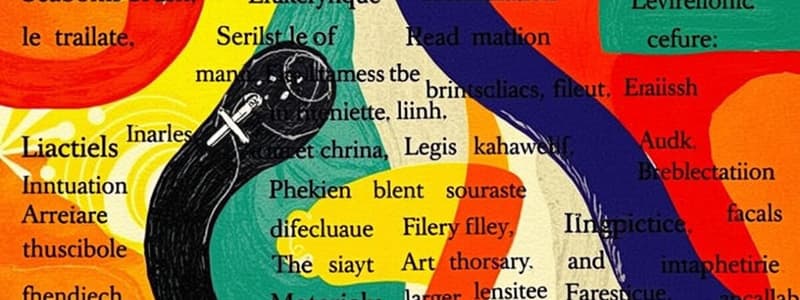Podcast
Questions and Answers
Which of the following is NOT considered a genre of literature?
Which of the following is NOT considered a genre of literature?
- Photography (correct)
- Drama
- Poetry
- Fiction
Which author is associated with the literary movement of Modernism?
Which author is associated with the literary movement of Modernism?
- Shakespeare
- Jane Austen
- Mark Twain
- Virginia Woolf (correct)
What is an effective method for language learning?
What is an effective method for language learning?
- Avoiding exposure to the language
- Learning without practice
- Ignoring grammar
- Self-study (correct)
How does English influence global media?
How does English influence global media?
Which trend reflects the evolving nature of language?
Which trend reflects the evolving nature of language?
What language family does English belong to?
What language family does English belong to?
Which dialect of English is known for its unique vocabulary and spelling in the USA?
Which dialect of English is known for its unique vocabulary and spelling in the USA?
Which type of sentence contains one independent clause?
Which type of sentence contains one independent clause?
What process involves adding prefixes or suffixes to change the meaning of a word?
What process involves adding prefixes or suffixes to change the meaning of a word?
Which of the following describes words that sound the same but have different meanings?
Which of the following describes words that sound the same but have different meanings?
What is the study of sounds in language called?
What is the study of sounds in language called?
Which punctuation symbol is used to indicate the end of a sentence?
Which punctuation symbol is used to indicate the end of a sentence?
What is the term for words with opposite meanings?
What is the term for words with opposite meanings?
Flashcards are hidden until you start studying
Study Notes
Overview of English
- Language Family: English is a West Germanic language.
- Origins: Evolved from Old English, influenced by Norse, Latin, and French.
- Global Status: Widely spoken as a first and second language; considered a global lingua franca.
Major Dialects
- British English: Standard dialects in the UK, including Received Pronunciation.
- American English: Varieties across the USA; known for unique vocabulary and spelling.
- Australian English: Distinct terms and pronunciations; influenced by British English.
- Indian English: Incorporates local languages and dialects; unique grammar and vocabulary.
Grammar
-
Parts of Speech:
- Nouns: Names of people, places, things.
- Verbs: Action or state of being.
- Adjectives: Describe nouns.
- Adverbs: Modify verbs, adjectives, or other adverbs.
- Pronouns: Replace nouns.
- Prepositions: Show relationships between nouns/pronouns and other words.
- Conjunctions: Connect words, phrases, or clauses.
-
Sentence Structure:
- Simple: One independent clause.
- Compound: Two or more independent clauses joined by a conjunction.
- Complex: One independent and at least one dependent clause.
Vocabulary
-
Word Formation:
- Derivation: Adding prefixes/suffixes to change meaning or grammatical function.
- Compounding: Combining two or more words to create a new meaning.
-
Types:
- Synonyms: Words with similar meanings.
- Antonyms: Words with opposite meanings.
- Homophones: Words that sound the same but have different meanings.
Pronunciation
- Phonetics: Study of sounds; English has 44 phonemes.
- Stress: Certain syllables in words are emphasized.
- Intonation: Variation in pitch during speech to convey meaning.
Writing System
- Alphabet: Latin script with 26 letters.
- Punctuation: Symbols that clarify meaning (e.g., periods, commas, question marks).
- Spelling: Often inconsistent due to historical influences.
Literature
- Genres: Includes poetry, drama, fiction, non-fiction.
- Notable Authors: Shakespeare, Jane Austen, Mark Twain, Virginia Woolf.
- Literary Movements: Romanticism, Modernism, Postmodernism.
Language Learning
- Methods: Immersion, formal education, self-study.
- Skills: Reading, writing, listening, speaking.
- Resources: Textbooks, online courses, language exchange.
Cultural Influence
- Media: English dominates global media, including films, music, and literature.
- Internet: Predominantly used language online; key for global communication.
Current Trends
- Evolving Language: Vocabulary and usage continually change, influenced by technology and culture.
- Slang and Dialects: New forms of expression emerging, especially among younger speakers.
Overview of English
- West Germanic language with roots in Old English.
- Influenced by Norse, Latin, and French languages.
- Considered a global lingua franca, widely spoken as a first and second language.
Major Dialects
- British English: Includes Received Pronunciation and various standard dialects in the UK.
- American English: Features distinct vocabulary and spelling variations across the USA.
- Australian English: Displays unique terms and pronunciations influenced by British English.
- Indian English: Integrates local languages, resulting in unique grammar and vocabulary.
Grammar
- Parts of Speech:
- Nouns: Represent people, places, and things.
- Verbs: Indicate actions or states of being.
- Adjectives: Provide descriptions for nouns.
- Adverbs: Modify verbs, adjectives, or other adverbs.
- Pronouns: Act as substitutes for nouns.
- Prepositions: Clarify relationships between nouns/pronouns and other words.
- Conjunctions: Connect words, phrases, or clauses.
- Sentence Structure:
- Simple: Contains one independent clause.
- Compound: Combines two or more independent clauses with a conjunction.
- Complex: Features one independent clause and at least one dependent clause.
Vocabulary
- Word Formation:
- Derivation: Alters meaning or grammatical function through prefixes/suffixes.
- Compounding: Merges two or more words to create new meanings.
- Types of Vocabulary:
- Synonyms: Words that hold similar meanings.
- Antonyms: Words that express opposite meanings.
- Homophones: Words that sound alike but differ in meaning.
Pronunciation
- Phonetics: English encompasses 44 phonemes, the distinct units of sound.
- Stress: Emphasis placed on certain syllables within words.
- Intonation: Variations in pitch during speech to convey different meanings.
Writing System
- Alphabet consists of Latin script featuring 26 letters.
- Punctuation marks, like periods and commas, aid in clarifying meaning.
- Spelling is frequently inconsistent due to diverse historical influences.
Literature
- Genres encompass poetry, drama, fiction, and non-fiction.
- Notable authors include Shakespeare, Jane Austen, Mark Twain, and Virginia Woolf.
- Literary movements consist of Romanticism, Modernism, and Postmodernism.
Language Learning
- Methods include immersion, formal education, and self-study techniques.
- Essential skills: reading, writing, listening, and speaking.
- Resources available: textbooks, online courses, and language exchange programs.
Cultural Influence
- English language predominates in global media, including films, music, and literature.
- Serves as the principal language online, facilitating global communication.
Current Trends
- Language is continually evolving, with vocabulary and usage influenced by technology and culture.
- Emergence of slang and new dialects particularly among younger speakers.
Studying That Suits You
Use AI to generate personalized quizzes and flashcards to suit your learning preferences.




